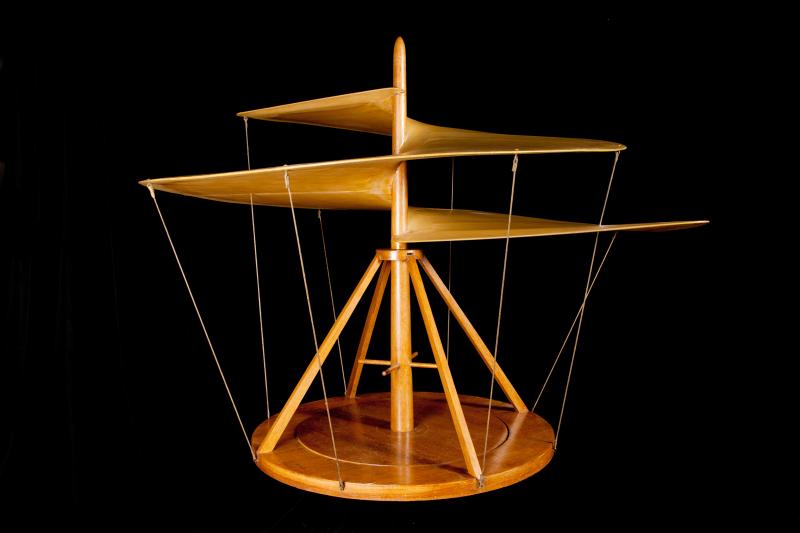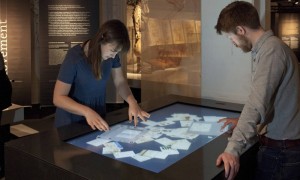Leonardo da Vinci: The Mechanics of Genius, Science Museum | reviews, news & interviews
Leonardo da Vinci: The Mechanics of Genius, Science Museum
Leonardo da Vinci: The Mechanics of Genius, Science Museum
Small but enlightening show about the polymath's machines

Was Leonardo da Vinci (1452-1519), who straddled the arts and science in such a unique way, several hundred years before his time? Did the painter-inventor-engineer really draw the prototypes for, inter alia, the aeroplane, the motor car, the helicopter and the submarine, or were they doodles to which history has ascribed more genius than they are due?
This show has its origins in an exhibition in Milan in 1952 to celebrate the 500th anniversary of Leonardo's birth, and the 39 models made from his drawings of machines – many of which would have seemed fantastical in his time – are presented here. How exquisite they are, worthy of being included in an art exhibition as well as in a science museum. Actually, some of them would have a more apt place in an art show as, a note tells us, they “have no practical purpose, being fragments of existing machines, and are often incomplete or lacking in details relating to mechanical and structural parts”.
Leonardo was a superb draughtsman, and the model-makers have done him proud. My favourite, the aerial screw (main picture) is, close-up, breathtakingly beautiful. It is claimed as the first model for a helicopter, but (as with most of his ideas) Leonardo never actually built or tested it, although his notes and drawings are precise enough to indicate how the device would operate; modern scientists, however, say it would never get off the ground.
 It seems strange to think it of such a polymath, but Leonardo was, for at least a part of his career, a jobbing engineer – as a military architect for the city of Venice, and later for Cesare Borgia in Rome. And while we may think of some his greatest talents being poured into inventions, in reality he often refined or developed others' ideas – such as his weaving machines for the ruling Sforza family in Milan – trying to improve machines' efficiency or work processes.
It seems strange to think it of such a polymath, but Leonardo was, for at least a part of his career, a jobbing engineer – as a military architect for the city of Venice, and later for Cesare Borgia in Rome. And while we may think of some his greatest talents being poured into inventions, in reality he often refined or developed others' ideas – such as his weaving machines for the ruling Sforza family in Milan – trying to improve machines' efficiency or work processes.
Nature was so often his inspiration, as his diving suit, complete with webbed gloves for the diver, and his attempt at a flying-machine, based on the movement of a bird's wings in flight, demonstrate. The exhibition's curators attempt to draw a line – not entirely convincingly – between Leonardo's work and that of scientists today in their use of biomimicry in robotics and aeronautics. What is more striking is how at home some inventions – such as his armoured vehicle or his moving siege machine – might look in futuristic film franchises such as Mad Max.
The exhibition promises “games and multimedia installations” (pictured above) but children of all ages shouldn't get too excited; one game consisted of moving some pulleys and gears, and the description "multimedia" might be an exaggeration that a five-year-old used to playing with an iPad would scoff at. But on the whole this is an enjoyable experience, with much to learn, and even more to be in awe of.
rating
Explore topics
Share this article
The future of Arts Journalism
You can stop theartsdesk.com closing!
We urgently need financing to survive. Our fundraising drive has thus far raised £49,000 but we need to reach £100,000 or we will be forced to close. Please contribute here: https://gofund.me/c3f6033d
And if you can forward this information to anyone who might assist, we’d be grateful.

Subscribe to theartsdesk.com
Thank you for continuing to read our work on theartsdesk.com. For unlimited access to every article in its entirety, including our archive of more than 15,000 pieces, we're asking for £5 per month or £40 per year. We feel it's a very good deal, and hope you do too.
To take a subscription now simply click here.
And if you're looking for that extra gift for a friend or family member, why not treat them to a theartsdesk.com gift subscription?
more Visual arts
 'We are bowled over!' Thank you for your messages of love and support
Much-appreciated words of commendation from readers and the cultural community
'We are bowled over!' Thank you for your messages of love and support
Much-appreciated words of commendation from readers and the cultural community
 Photo Oxford 2025 review - photography all over the town
At last, a UK festival that takes photography seriously
Photo Oxford 2025 review - photography all over the town
At last, a UK festival that takes photography seriously
![SEX MONEY RACE RELIGION [2016] by Gilbert and George. Installation shot of Gilbert & George 21ST CENTURY PICTURES Hayward Gallery](https://theartsdesk.com/sites/default/files/styles/thumbnail/public/mastimages/Gilbert%20%26%20George_%2021ST%20CENTURY%20PICTURES.%20SEX%20MONEY%20RACE%20RELIGION%20%5B2016%5D.%20Photo_%20Mark%20Blower.%20Courtesy%20of%20the%20Gilbert%20%26%20George%20and%20the%20Hayward%20Gallery._0.jpg?itok=7tVsLyR-) Gilbert & George, 21st Century Pictures, Hayward Gallery review - brash, bright and not so beautiful
The couple's coloured photomontages shout louder than ever, causing sensory overload
Gilbert & George, 21st Century Pictures, Hayward Gallery review - brash, bright and not so beautiful
The couple's coloured photomontages shout louder than ever, causing sensory overload
 Lee Miller, Tate Britain review - an extraordinary career that remains an enigma
Fashion photographer, artist or war reporter; will the real Lee Miller please step forward?
Lee Miller, Tate Britain review - an extraordinary career that remains an enigma
Fashion photographer, artist or war reporter; will the real Lee Miller please step forward?
 Kerry James Marshall: The Histories, Royal Academy review - a triumphant celebration of blackness
Room after room of glorious paintings
Kerry James Marshall: The Histories, Royal Academy review - a triumphant celebration of blackness
Room after room of glorious paintings
 Folkestone Triennial 2025 - landscape, seascape, art lovers' escape
Locally rooted festival brings home many but not all global concerns
Folkestone Triennial 2025 - landscape, seascape, art lovers' escape
Locally rooted festival brings home many but not all global concerns
 Sir Brian Clarke (1953-2025) - a personal tribute
Remembering an artist with a gift for the transcendent
Sir Brian Clarke (1953-2025) - a personal tribute
Remembering an artist with a gift for the transcendent
 Emily Kam Kngwarray, Tate Modern review - glimpses of another world
Pictures that are an affirmation of belonging
Emily Kam Kngwarray, Tate Modern review - glimpses of another world
Pictures that are an affirmation of belonging
 Kiefer / Van Gogh, Royal Academy review - a pairing of opposites
Small scale intensity meets large scale melodrama
Kiefer / Van Gogh, Royal Academy review - a pairing of opposites
Small scale intensity meets large scale melodrama
 Jenny Saville: The Anatomy of Painting, National Portrait Gallery review - a protégé losing her way
A brilliant painter in search of a worthwhile subject
Jenny Saville: The Anatomy of Painting, National Portrait Gallery review - a protégé losing her way
A brilliant painter in search of a worthwhile subject
 Abstract Erotic, Courtauld Gallery review - sculpture that is sensuous, funny and subversive
Testing the boundaries of good taste, and winning
Abstract Erotic, Courtauld Gallery review - sculpture that is sensuous, funny and subversive
Testing the boundaries of good taste, and winning
 Edward Burra, Tate Britain review - watercolour made mainstream
Social satire with a nasty bite
Edward Burra, Tate Britain review - watercolour made mainstream
Social satire with a nasty bite

Add comment